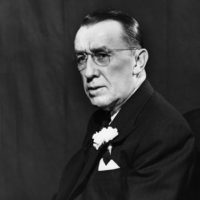
Basil O’Connor
March of Dimes (National Foundation for Infantile Paralysis)
For extraordinary administrative leadership in the eradication of a crippling disease of childhood, poliomyelitis, through development of an effective vaccine.
Probably more than any other layman of modern times, Mr. Basil O'Connor has contributed significantly to the substantial conquest throughout the world of a major disease of childhood, paralytic poliomyelitis. Since the introduction of the Salk vaccine, the incidence of polio in the United States has declined 86 percent, from an annual average of 38,700 cases in the pre-vaccine years 1950-1954 to only 5500 in 1957. Although we are prone to think of him as president of the National Foundation for Infantile Paralysis, it must be remembered that he has served also with distinction as president of two other organizations—the American National Red Cross and the National Health Council.
As a dynamic humanitarian, he has left his imprint on the fields of education, social service and public health. Perhaps outstanding is the unprecedented impact on the solution of a disease problem which he achieved through the effective nationwide mobilization of volunteer health workers. A large part of this impact was the result of his courageous insistence on emphasizing basic research, where additional personal services to the afflicted would have been easier and more readily accepted. In all his endeavors, he has supported the three fundamental steps in any progressive social program: experimentation, application, and evaluation.
Under Mr. O'Connor's leadership, the National Foundation for Infantile Paralysis has offered a pace-setting example of a volunteer organization with strong "grassroots" support at the local level resulting from firm national leadership utilizing the highest professional skills available on a worldwide basis. One of the interesting technical contributions resulting from this organization's administrative experience has been the integration of administrative costs into research grants.
All of these contributions, in addition to the tens of thousands of children whose lives will be happier because of the conquest of paralytic poliomyelitis, represent cogent reasons for welcoming Mr. O'Connor to the distinguished ranks of earlier Albert Lasker Award recipients.
